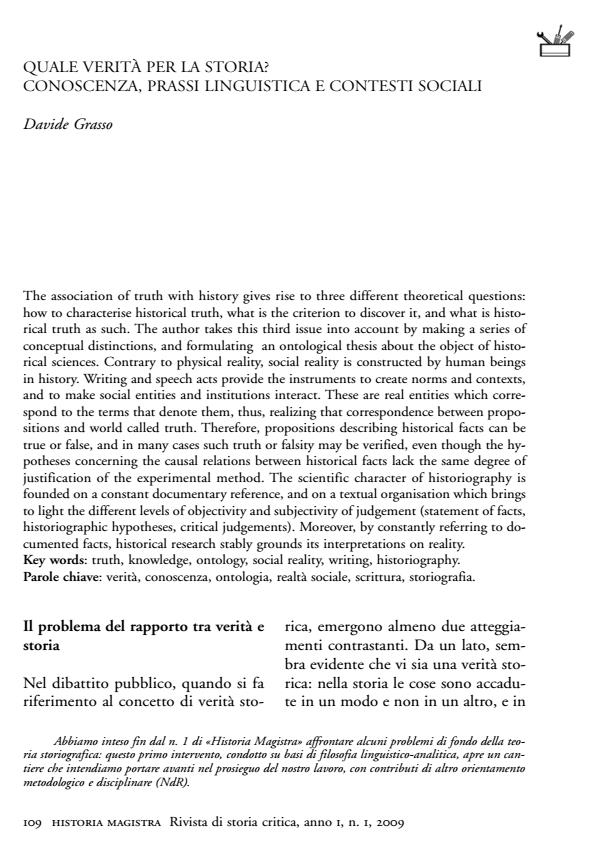Quale verità per la storia? Conoscenza, prassi linguistica e contesti sociali
Titolo Rivista HISTORIA MAGISTRA
Autori/Curatori Davide Grasso
Anno di pubblicazione 2009 Fascicolo 2009/1
Lingua Italiano Numero pagine 13 P. 109-121 Dimensione file 136 KB
DOI 10.3280/HM2009-001011
Il DOI è il codice a barre della proprietà intellettuale: per saperne di più
clicca qui
Qui sotto puoi vedere in anteprima la prima pagina di questo articolo.
Se questo articolo ti interessa, lo puoi acquistare (e scaricare in formato pdf) seguendo le facili indicazioni per acquistare il download credit. Acquista Download Credits per scaricare questo Articolo in formato PDF

FrancoAngeli è membro della Publishers International Linking Association, Inc (PILA), associazione indipendente e non profit per facilitare (attraverso i servizi tecnologici implementati da CrossRef.org) l’accesso degli studiosi ai contenuti digitali nelle pubblicazioni professionali e scientifiche.
Quale verità per la storia? Conoscenza, prassi linguistica e contesti sociali - The association of truth with history gives rise to three different theoretical questions: how to characterise historical truth, what is the criterion to discover it, and what is historical truth as such. The author takes this third issue into account by making a series of conceptual distinctions, and formulating an ontological thesis about the object of historical sciences. Contrary to physical reality, social reality is constructed by human beings in history. Writing and speech acts provide the instruments to create norms and contexts, and to make social entities and institutions interact. These are real entities which correspond to the terms that denote them, thus, realizing that correspondence between propositions and world called truth. Therefore, propositions describing historical facts can be true or false, and in many cases such truth or falsity may be verified, even though the hypotheses concerning the causal relations between historical facts lack the same degree of justification of the experimental method. The scientific character of historiography is founded on a constant documentary reference, and on a textual organisation which brings to light the different levels of objectivity and subjectivity of judgement (statement of facts, historiographic hypotheses, critical judgements). Moreover, by constantly referring to documented facts, historical research stably grounds its interpretations on reality. Key words: truth, knowledge, ontology, social reality, writing, historiography.
Davide Grasso, Quale verità per la storia? Conoscenza, prassi linguistica e contesti sociali in "HISTORIA MAGISTRA" 1/2009, pp 109-121, DOI: 10.3280/HM2009-001011